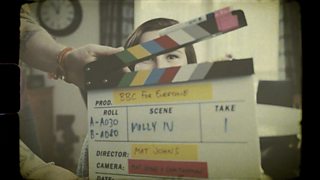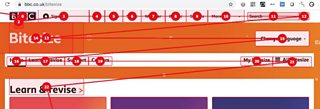An accessible digital BBC – 2019 in review
Emma Pratt Richens
Senior Accessibility Specialist, BBC Design & Engineering
Tagged with:

BBC for Everyone – take 1 clapperboard
The BBC Accessibility Champion Network is probably one of the oldest in the industry. This year it surpassed 200 champions. There is also an alumnus of 75+ now encouraging inclusive design and accessibility elsewhere in the industry. Here are the top highlights of many accessibility improvements in BBC digital products this year:
UX&D and Internal Tools:
The ‘BBC for Everyone’ video was published by GEL, along with draft technical docs. Neurodiversity won awards. Internal S&SD did screen reader user research for Optimo, a new article editor for News journalists. They also reviewed and improved accessibility of Audiences, the new site for audience research, reports and data.
iPlayer and Sounds:
The web media player introduced subtitle size controls. iPlayer added an ‘Accessibility Help’ link for assistive technology users. iPlayer and Sounds both made efforts to respect an individual’s 'reduce motion’ choice, which can be set in their OS preferences. iPlayer Mobile adopted an ‘accessible first’ mantra to work on a new player interface, available to opt in and try via the app settings. Work has included research with screen reader users and raising issues with OS providers. Behind the scenes work was completed that enabled both iPlayer TV and the new mobile player to add in-player controls for audio description and sign language. iPlayer and Sounds both have active accessibility guilds, and have integrated accessibility into processes, engineering methods, and testing strategies.

iPlayer Accessibility Help link
Children’s Games & Apps:
Research relationships continued with Seashell Trust and Everyone Can. It enabled and supported user research for CBeebies, CBBC and Bitesize games and interactive content, in turn guiding work on relevant content and the ‘Accessible Games Guidelines’. Bitesize Primary
improved keyboard accessibility across their existing practice games. They also launched 7 new games, with 8 more in development, that deliver on at least one accessibility ‘pillar’.
News:
News index pages became more consistent, easier to navigate, and introduced the BBC Reith font, which is clearer and easier to read on small screens. World Service sites are being re-built with accessibility embedded at every stage. This has extended the champion network outside the UK. Accessibility swarms checked new components built for elections. And Visual Journalism considered accessibility from the start of each project. A scrolling story format that is keyboard accessible and has a toggle for animation is one example of the outcomes from that. The integrated approach shows how Catharine Green becoming Accessibility Lead was a decision that established accessibility as a clear priority for News.
Sport:
Following the example of News, Sophie Beaumont became Accessibility Lead for Sport, and an Accessibility Guild was set up. They embedded accessibility considerations into all team processes and built up a prioritised backlog of improvements. The teams have since created new pages and features that are some of the most accessible Sport experiences yet.
Weather:
A redesign of tide table pages for Coast and Sea section means they are now responsive, more legible and ‘glanceable’, and adapted for touch devices. The improved navigation for future dates also links to an accessible table version of the information with live updates provided to assistive technology. And animated indicators update in real time while adhering to an individual’s ‘reduce motion’ preferences.
Web Core:
This year a big change of direction toward a centralised approach took shape. The goal is a shared, non-versioned kit of parts, from which to create digital products and services. The team are building brand new components following the GEL technical docs. The docs provide pragmatic advice for actual implementation with accessibility built in. This approach should also mean that future accessibility improvements roll out fast.
Voice & AI:
New tech on the block means a lot of user research. This has ensured the BBC’s collective Alexa skill is intuitive to navigate while reducing distraction and cognitive load. And it’s informing work begun on ‘Beeb’, a voice assistant from the BBC. Accessibility is a key requirement of both the user interface and brand development.
BBC Studios:
The commercial arm of the BBC may need a slightly different approach, but accessibility is still a key requirement. A redesign of Top Gear has provided the perfect opportunity to educate the team and make accessibility part of the end-to-end process of delivery.
Elsewhere:
Small changes, like improving link text in the cookie banner or checking the accessibility of a new local search feature before implementation, can ensure a better experience for many people. Though our champions don’t keep to small. Many blogged and presented this year, including Peter Gould and Nicola Quinn. They presented “How to Bake Muffins” at a #BuildTheBBC event open to the public. A heart-warming tale about why accessibility should be considered from the start of a project. Peter also built taba11y in his spare time, a useful Chrome plugin already being used in-house.

taba11y enumerating tab stops
Coming Up
Most BBC teams now ‘bake in’ accessibility. Look out for improved universal sign-in and children’s sign-in from BBC Account team. And also improved audience participation experiences. Research is being conducted to support insights into how children with varied and complex impairment use technology. Other research is looking at how to make interactive content more accessible for neurodiverse users. And the new accessibility guilds and groups in Bitesize, iPlayer& Sounds, and Voice & AI should make an impact throughout 2020.
Conversations have definitely moved on from explaining ‘why’ accessibility is important. We now talk collectively about ‘how’ we deliver accessibility. A champion network that keeps accessibility part of the daily conversations is pivotal to that shift. The BBC sets an accessibility benchmark that many organisations strive to emulate. No easy feat in the constantly changing and evolving digital space. An active network of Accessibility advocates, our Champions, Leads, Groups and Guilds, is what makes that possible.
